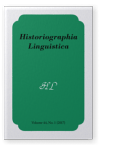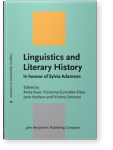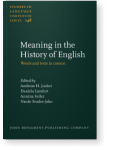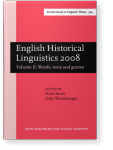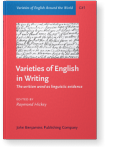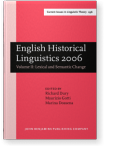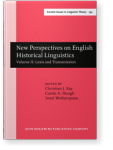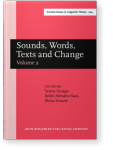Philip Durkin
List of John Benjamins publications for which Philip Durkin plays a role.
2017 Academy Dictionaries 1600–1800 . By John Considine Historiographia Linguistica 44:1, pp. 171–176 | Review
2016 Chapter 4. Borrowing and copy: A philological approach to Early Modern English lexicology Linguistics and Literary History: In honour of Sylvia Adamson, Auer, Anita, Victorina González-Díaz, Jane Hodson and Violeta Sotirova (eds.), pp. 71–86 | Article
Adamson (1999) demonstrates the importance of “copy” (copia) as a motivation
for lexical borrowing in early modern English. Our paper will take this observation
as its starting point. Using data from the Historical Thesaurus of the Oxford
English Dictionary to gain an overview of the available… read more
2013 On the importance of noting uncertainty in etymological research: Some implications of a re-examination of the etymology of road Meaning in the History of English: Words and texts in context, Jucker, Andreas H., Daniela Landert, Annina Seiler and Nicole Studer-Joho (eds.), pp. 63–80 | Article
The traditional view of the etymology of modern English road is that it shows a semantic development of the reflex of Old English rād, Middle English (southern) rōd, (northern) rād, recorded in senses including ‘action or an act of riding’ (related to Old English rīdan ‘to ride’). The etymology of… read more
2012 Etymology and the OED: The uses of etymology in a historical dictionary English Historical Linguistics 2008: Selected papers from the fifteenth International Conference on English Historical Linguistics (ICEHL 15), Munich, 24-30 August 2008, Sauer, Hans and Gaby Waxenberger (eds.), pp. 3–20 | Article
Etymology and historical dictionaries have a symbiotic role: etymology has a key structural role in a historical dictionary, and the data of historical dictionaries is crucial for making advances in the study of etymology. This chapter draws illustrative examples from the new edition of the OED… read more
2010 Assessing non-standard writing in lexicography Varieties of English in Writing: The written word as linguistic evidence, Hickey, Raymond (ed.), pp. 43–60 | Article
In this chapter I will look at some aspects of the treatment of non-standard and regional varieties in historical dictionaries, especially the OED. I will examine closely the spelling forms found in a series of passages written by non-professional, naïve writers, and the challenges for… read more
2008 Latin loanwords of the early modern period: How often did French act as an intermediary? English Historical Linguistics 2006: Selected papers from the fourteenth International Conference on English Historical Linguistics (ICEHL 14), Bergamo, 21–25 August 2006, Dury, Richard, Maurizio Gotti and Marina Dossena (eds.), pp. 185–202 | Article
This paper examines borrowing into English from Latin and from French during the early modern period (EModE), based on documentation from the third edition of the Oxford English Dictionary now in progress (OED3). It looks in particular at dual borrowings from Latin and French, and also at cases of… read more
2004 Loanword etymologies in the third edition of the OED: Some questions of classification New Perspectives on English Historical Linguistics: Selected papers from 12 ICEHL, Glasgow, 21–26 August 2002, Kay, Christian, Carole Hough and Irené Wotherspoon (eds.), pp. 79–90 | Article
2002 Changing documentation in the Third Edition of the Oxford English Dictionary: Sixteenth-century vocabulary as a test case Sounds, Words, Texts and Change: Selected papers from 11 ICEHL, Santiago de Compostela, 7–11 September 2000, Fanego, Teresa, Belén Méndez-Naya and Elena Seoane (eds.), pp. 65–81 | Article
